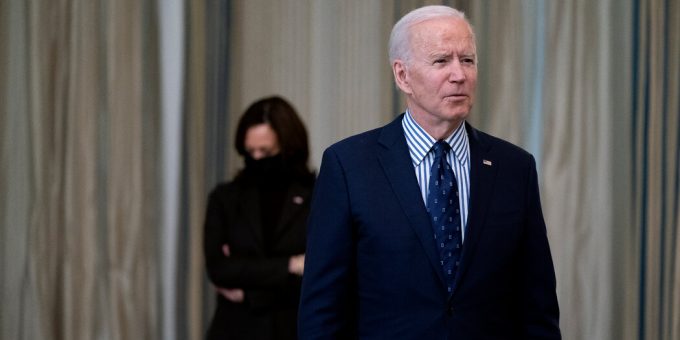
Here’s what you need to know:
President Biden, targeting Trump-era policies that established rules for how college campuses investigate sexual violence, will on Monday order the Department of Education to reassess this and other regulations issued under Title IX, a 1972 law that prohibits sex-based discrimination in federally funded schools.
Mr. Biden, who has promised since his campaign to reassess a number of the former administration’s education policies, has long vowed to dismantle rules that afforded greater protections to students accused of sexual assault. The effort was a signature policy change by the Education Department under President Donald J. Trump. It also reversed sweeping changes, made in favor of protecting victims, to Title IX made under the Obama administration.
Miguel Cardona, the new education secretary, will be directed to suspend, revise or rescind changes made to Title IX, administration officials familiar with Mr. Biden’s plans said on Sunday evening.
The review will also seek to assess rules that could allow “discrimination on basis of sexual orientation or gender identity,” an official said. In January, the administration retracted its support for a Trump-era lawsuit seeking to block transgender students from participating in girls’ high school sports.
Mr. Biden is also expected on Monday to issue an executive order formally establishing the creation of a White House council on gender equity, an effort that was dismantled during the Trump administration.
Officials on the Gender Policy Council will be required to submit a governmentwide strategy for advancing gender equity directly to the president, according to an official familiar with the planning who spoke on the condition of anonymity on Sunday evening.
The council will be co-led by Julissa Reynoso, chief of staff to Jill Biden, the first lady, and Jennifer Klein, a former senior adviser to Hillary Clinton when she was first lady. The team will have four other officials, including senior advisers who focus on policies to prevent gender-based violence and on promoting equity for Black, Latina and Indigenous women and girls.
Mr. Biden is expected to detail his directives in a speech on Monday afternoon to celebrate International Women’s Day. Earlier in the day, he is scheduled to visit a veteran’s health center with Denis McDonough, the Veterans Affairs secretary. One of Mr. Biden’s first acts in office was to sign an executive order that established gender identity and sexual orientation as protected classes under federal discrimination laws.

Senator Roy Blunt of Missouri, a fixture of the Republican establishment in Congress, announced Monday that he would not seek re-election in 2022, delivering a major blow to party leaders and opening the way for another conservative candidate more closely aligned with former President Donald J. Trump.
Mr. Blunt, the fourth-ranking Senate Republican, told reporters in January that he was planning to run for a third term, and many Republicans had assumed he was positioning himself to do so, as he worked to avoid alienating Mr. Trump.
But on Monday, Mr. Blunt said after nearly 12,000 votes in Congress, including a stint as House Republican whip, he had decided to call it quits.
“After 14 general election victories — three to county office, seven to the United States House of Representatives, and four statewide elections — I won’t be a candidate for re-election to the United States Senate next year,” Mr. Blunt said in a video posted on social media on Monday morning. Speaking outside of his family’s dairy barn, Mr. Blunt said he had always been interested in the “practical sense of getting the job done” but did not expound on his decision.
The departure of Mr. Blunt, 71, will accelerate a brain drain already underway among Senate Republicans and will likely shift the character of the body. A bipartisan deal-maker and fixture of Washington social circles, he was the rare member of Congress to serve in high-ranking posts in both House and Senate leadership. He was also in charge of planning President Biden’s inauguration in January, a delicate task that required him to navigate explosive political crosscurrents and the threat of violence after the Jan. 6 mob attack on the Capitol.
His decision not to seek another term follows similar ones by Senator Rob Portman of Ohio, one of Republicans’ leading policy minds and a key moderate; Senator Richard Shelby of Alabama, a deal-making former chairman of the Appropriations Committee; and Senator Patrick J. Toomey of Pennsylvania, a top party voice on free-market economic matters.
In their place has emerged a crop of Trump acolytes who have mirrored the former president’s combative style and shunned bipartisan compromise.
Missouri, a one-time swing state, has shifted rightward in recent decades, meaning the seat will most likely stay in Republican hands. Mr. Blunt had not formally drawn a primary challenger, but his close alliance with Senator Mitch McConnell of Kentucky, the minority leader, and his status as a consummate Washington insider put him at risk for a bitter intraparty fight to hold his seat.
Eric Greitens, the state’s former Republican governor who resigned in a cloud of scandal in 2018, said last week that he was “evaluating” whether to challenge Mr. Blunt in a primary, telling a St. Louis radio station that he was “certainly going to keep the door open” to a campaign. Mr. Greitens, a decorated Navy SEAL, has sought to position himself as a true heir to Mr. Trump’s political style and accused Mr. Blunt of inadequately backing him.
“It’s not enough to have an ‘R’ behind their name, we have to have people who are willing to take on the establishment to actually fight against the swamp,” Mr. Greitens said. He attacked Mr. Blunt for “siding with Mitch McConnell,” for criticizing Mr. Trump’s conduct around the Jan. 6 assault on the Capitol, and for attending Mr. Biden’s inauguration.
Mr. Greitens would not go unchallenged, particularly by Missouri’s donor class still fuming over his run as governor. Among the other possible Republican candidates are Jay Ashcroft, the Missouri secretary of state; Eric Schmitt, the attorney general; Jean Evans, a former state party leader; Mike Kehoe, the lieutenant governor; Representatives Jason Smith and Ann Wagner; and Carl Edwards, a former NASCAR driver.
Democrats, who have lost nearly every race for statewide office over the last decade, have no clear front-runner. Scott Sifton, a veteran of the Missouri statehouse, had already jumped into the race. Democrats in the state have suggested Chris Koster, a moderate Democrat who lost to Mr. Greitens in the 2016 race for governor, could run.
Jason Kander, who narrowly lost to Mr. Blunt in 2016, and former Senator Claire McCaskill, who lost her re-election bid in 2018, both said on Monday that they would not run.

President Biden will deliver the first prime time address of his presidency on Thursday, marking one year since the adoption of sweeping measures to deal with the coronavirus pandemic, which subsequently killed nearly 525,000 Americans and battered the economy.
The president will deliver a direct-to-camera address to “discuss the many sacrifices the American people have made over the last year and the grave loss communities and families across the country have suffered,” Jen Psaki, the White House press secretary, told reporters on Monday.
Mr. Biden’s address comes a year to the day since the World Health Organization declared the spread of the coronavirus a pandemic and a year to the night since former President Donald J. Trump delivered an address on the virus from the Oval Office, after initially dismissing it as a minor problem that would go away on its own.
A national emergency declaration, which gave the White House flexibility to direct federal resources to efforts to fight the pandemic, was issued on March 13, 2020.
Mr. Biden’s speech will be forward-looking, Ms. Psaki said, and the president plans to highlight “the role that Americans will play” in getting the country “back to normal.”
Her comments came shortly after the Centers for Disease Control and Prevention recommended a slight easing of restrictions on people who have received vaccinations.
On Monday afternoon, Mr. Biden visited the Washington DC Veterans Affairs Medical Center, which has the capacity to administer hundreds of vaccinations a day, to discuss efforts to vaccinate veterans. On a brief tour, the president spoke with assembled Veterans Affairs officials, who explained how they prepared and administered vaccines.
“We’re really warping the speed now,” Mr. Biden told the group. “We’re doing pretty good across the country. We’re going to hit 100 million soon.”
The address is also timed to capitalize on a major political victory for the young presidency. Mr. Biden’s $1.9 trillion pandemic relief bill, which passed the Senate over the weekend, is likely to be adopted by the House on Tuesday. At the veterans center, Mr. Biden told the crowd that he’d sign the bill into law “as soon as I can get it.”
While Mr. Biden’s team has been cautious not to take a victory lap while so many Americans are suffering, he needs to take credit for its fast passage to gain the leverage needed for looming fights over other items on his agenda.
An ABC News/Ipsos poll released Sunday found that 68 percent of Americans approved of the way Mr. Biden is handling the crisis.

President Biden has abruptly canceled a visit to the biotech firm Emergent BioSolutions a day after The New York Times published a lengthy investigation into how the Maryland company, which is making coronavirus vaccines under contract with the federal government, used a web of Washington connections to gain outsized influence over the nation’s emergency medical reserve.
The White House announced on Monday that instead of visiting Emergent’s Baltimore facility on Wednesday, as Mr. Biden had planned, the president will convene a meeting at the White House with executives of the pharmaceutical giants Merck and Johnson & Johnson, who were also to attend the session in Baltimore. Merck and Emergent are each partnering separately with Johnson & Johnson to manufacture that company’s coronavirus vaccine.
“We just felt it was a more appropriate place to have the meeting,” Mr. Biden’s press secretary, Jen Psaki, told reporters in explaining the decision.
Emergent has more than $600 million in contracts with the federal government to manufacture coronavirus vaccines and to expand its fill-and-finish capacity for making vaccines and therapeutics. A senior administration official said Monday that only executives from Merck and Johnson & Johnson would attend Wednesday’s White House session.
An Emergent spokeswoman did not immediately respond to questions about the cancellation on Monday. The spokeswoman, Nina DeLorenzo, previously defended the company’s business with the government in written responses to questions, saying, “When almost no one else would invest in preparing to protect the American public from grave threats, Emergent did, and the country is better prepared today because of it.”
The Times investigation focused on the emergency reserve, the Strategic National Stockpile, which became infamous during the coronavirus pandemic for its lack of critical supplies such as N95 masks.
Throughout most of the last decade, the government has spent nearly half of the stockpile’s half-billion-dollar annual budget on Emergent’s anthrax vaccines, The Times found.
Meanwhile, products for pandemic preparedness, including N95s, repeatedly lost out in the competition for funding. When the virus emerged last year, the stockpile quickly ran short of masks and other personal protective equipment, leaving some health care workers to resort to wearing trash bags for protection — an enduring image of the government’s failed response. Yet during 2020, the government paid Emergent $626 million for products that included vaccines to protect against a terrorist attack using anthrax.
The company is now manufacturing Covid-19 vaccines for AstraZeneca as well as for Johnson & Johnson.
Emergent is a lobbying powerhouse in Washington. The company, whose board is stocked with former federal officials, has deployed a lobbying budget more typical of some big pharmaceutical companies, The Times found, and has sometimes resorted to tactics considered underhanded even in Washington. Competing efforts to develop a better and cheaper anthrax vaccine, for example, collapsed after Emergent outmaneuvered its rivals, documents and interviews show.
Ms. DeLorenzo characterized the company’s lobbying as “education-focused” and “appropriate and necessary.”
Last week, the Biden administration announced it had brokered a deal in which Merck, a company with deep experience in making vaccines, would also partner with Johnson & Johnson to ramp up manufacturing of the company’s coronavirus vaccine.
On Friday, Ms. Psaki announced that the president would travel to Emergent’s Baltimore manufacturing facility, for an event with the chief executive officers of all three companies: Merck, Johnson & Johnson and Emergent. The change in schedule was announced Monday.

Deep in the Sahara, the C.I.A. is continuing to conduct secret drone flights from a small but steadily expanding air base, even as the Biden administration has temporarily limited drone strikes against suspected terrorists outside conventional war zones, such as Afghanistan, while it weighs whether to tighten Trump-era rules for such operations.
Soon after it set up the base in northern Niger three years ago, the C.I.A. was poised to launch drone strikes from the site.
But there is no public evidence that the agency has carried out anything but surveillance missions so far. The base was added to a small commercial airport largely to pay closer attention to southwestern Libya, a notorious haven for Al Qaeda, the Islamic State and other extremist groups that operate in the Sahel region of Niger, Chad and Mali.
The expanding capabilities at the base indicate that the C.I.A. would be ready to carry out armed drone strikes if the high-level review permits them.
In the meantime, the agency’s surveillance and reconnaissance missions appear to proceed, within the temporary constraints on strikes.
New satellite imagery shows that the air base in Dirkou, Niger, has grown significantly since The New York Times first reported the C.I.A. operations there in 2018, to include a much longer runway and increased security. The new imagery also shows for the first time what appears to be an MQ-9 Reaper drone taxiing to or from a clamshell hangar. The Times previously observed what was most likely a U-28A, an aircraft often used to support Special Operations Forces.
Under a directive that Mr. Biden’s national security adviser, Jake Sullivan, quietly imposed on Jan. 20, Inauguration Day, the military and the C.I.A. must now obtain White House permission to attack terrorism suspects in poorly governed places where there are scant or no American ground troops, such as Somalia, Yemen and Libya.
Under the Trump administration, they had been allowed to decide for themselves whether circumstances on the ground met certain conditions and an attack was justified.
The Biden administration’s review comes at a time when waves of terrorism and violence have seized Africa’s Sahel region, a vast sub-Saharan scrubland that stretches from Senegal to Sudan, and threaten to spread. The Islamic State in Libya has actively sought fresh recruits traveling north from West African nations, including Senegal and Chad.
The Pentagon’s Africa Command operates MQ-9 Reaper drones from Niamey, Niger’s capital, 800 miles southwest of Dirkou; and from a $110 million drone base in Agadez, Niger, 350 miles west of Dirkou. The military has carried out drone strikes against Qaeda and Islamic State militants in Libya, but none since September 2019.
Some security analysts question why the United States needs both military and C.I.A. drone operations in the same general vicinity to combat insurgents in Libya and the Sahel. In addition, France, which has about 5,100 troops in the Sahel region, began conducting its own Reaper drone strikes from Niamey against insurgents in Niger, Burkina Faso and Mali.

A suspected member of the Oath Keepers militia who provided security for Roger J. Stone Jr. on the day the Capitol was attacked has been arrested in connection with the riot, federal authorities said on Monday.
The man, Robert Minuta, was expected to appear on Monday afternoon in federal court in White Plains, N.Y. to face charges stemming from the siege. The documents containing the specific crimes that Mr. Minuta is said to have committed were not made public in advance of the hearing.
Last month, The New York Times and other media outlets identified Mr. Minuta, who owns a tattoo parlor in upstate New York, as one of six people with ties to the Oath Keepers who guarded Mr. Stone, a close ally and adviser to former President Donald J. Trump, on the morning of Jan. 6 or the day before.
Mr. Stone, whose sentence for seven felony charges was commuted by Mr. Trump, was in Washington on the day the then-president spoke to a crowd ahead of the assault on the Capitol. Mr. Stone has denied any involvement in the attack, posting a message online decrying the riot as “the lawless acts at the Capitol.”
The Oath Keepers, a paramilitary group mostly composed of former law enforcement officers and military veterans, was one of the far-right extremist organizations with the largest presence at the Capitol attack. So far, nine other accused members of the group have been charged in a wide-ranging conspiracy to overturn President Biden’s electoral victory in a plot that prosecutors say began not long after Election Day.

The task force examining security shortcomings on Capitol Hill after the Jan. 6 attack will brief House lawmakers on Monday about its findings and draft recommendations, as congressional leaders continue to examine the leadership and organizational failures that led to the breach by a mob of Trump supporters.
Lt. Gen. Russel L. Honoré, a retired Army officer whom Speaker Nancy Pelosi of California chose to lead the task force, and other members are expected to update lawmakers on the conclusions of their six-week review in three separate briefings meant to ensure social distancing.
The task force is recommending the hiring of more than 800 Capitol Police officers, mobile fencing around the complex and changes to Capitol Police Board procedures to allow the chief of the agency to quickly summon the National Guard during an emergency, according to a copy of its report previously obtained by The New York Times.
“The breach of the U.S. Capitol on Jan. 6 brought into stark relief the need to immediately improve the security of the Capitol complex and the security of congressional members and staff,” the report says. It also recommends funding for home security systems for every member of Congress and closer collaboration between the Capitol Police and intelligence officials in federal law enforcement.
The Pentagon is already evaluating a request from the chief of the Capitol Police to keep thousands of National Guard troops on Capitol Hill because of an increase in threats against lawmakers. The troops are scheduled to leave this week. Democratic lawmakers are also contemplating emergency supplemental funding to address the financial needs outlined in the report.
“In the coming days, against the backdrop of inquiry and investigation, Congress will engage in spirited debate over the Capitol’s current security arrangements and the change necessary to better secure the Capitol and safeguard its members, staff and employees,” the report says. “As you consider the recommendations of this task force, we must not forget it was the riotous actions of an angry mob that laid bare the vulnerabilities of the Capitol complex.”
Ms. Pelosi has also pushed to establish an independent commission, modeled on the panel created after the Sept. 11 attacks, to further examine the circumstances surrounding the Jan. 6 breach. Republicans have been reluctant to endorse the draft proposals outlined by Ms. Pelosi, accusing her of partisanship.
Representative Kevin McCarthy of California, the minority leader, on Sunday aired his doubts about General Honoré, who was applauded for his response to Hurricane Katrina. In a statement, Mr. McCarthy pointed to comments General Honoré made before his appointment, including what Mr. McCarthy described in part as an “inflammatory accusation that Capitol Police officers themselves were complicit in the attack.”
Mr. McCarthy said he and General Honoré met on Wednesday at the retired general’s request, a meeting the Republican leader said came “far too late in the process.”
“While there may be some worthy recommendations forthcoming, General Honoré’s notorious partisan bias calls into question the rationality of appointing him to lead this important security review,” Mr. McCarthy said. “It also raises the unacceptable possibility that the speaker desired a certain result: turning the Capitol into a fortress.”

The $1.9 trillion pandemic relief package moving through Congress advances an idea that Democrats have been nurturing for decades: establishing a guaranteed income for families with children.
Though framed in technocratic terms as an expansion of an existing tax credit, the child benefit is essentially a guaranteed income for families with children, akin to children’s allowances, providing most parents a monthly check of up to $300 per child.
The plan establishes the benefit for a single year. But if it becomes permanent, as Democrats intend, it will greatly enlarge the safety net for the poor and the middle class at a time when the volatile modern economy often leaves families moving between those groups. More than 93 percent of children — 69 million — would receive benefits under the plan, at a one-year cost of more than $100 billion.
The bill raises the maximum benefit most families will receive by up to 80 percent per child and extends it to millions of families whose earnings are too low to fully qualify under existing law. Currently, a quarter of children get a partial benefit, and the poorest 10 percent get nothing.
By the standards of previous aid debates, opposition has been surprisingly muted. While the bill has not won any Republican votes, critics have largely focused on other elements of the rescue package. Some conservatives have called the child benefit “welfare” and warned that it would bust budgets and weaken incentives to work or marry. But Senator Mitt Romney, Republican of Utah, has proposed a child benefit that is even larger, though it would be financed through other safety net cuts.
Here’s a guide to other key elements of the plan, which is scheduled to go before the House for final approval on Tuesday and then would head to President Biden for his signature.
The bill would give out $1,400 stimulus checks.
Individuals making under $75,000 and married couples making under $150,000 would receive direct payments of $1,400 per person. The bill would also provide $1,400 per dependent.
The payments would gradually decrease above those income levels and disappear entirely above an income cap: $80,000 for individuals and $160,000 for married couples.
Those caps were lowered from the thresholds in the House’s version of the stimulus plan, which set the cutoffs at $100,000 for individuals and $200,000 for married couples.
The current $300-per-week boost to unemployment benefits would continue.
The Senate bill extends unemployment programs through early September, including the $300-per-week federal supplement provided in the last stimulus plan passed in December.
Mr. Biden had proposed bumping up that supplemental benefit to $400 per week, which the House agreed to, but the Senate kept it at $300 weekly.
Money would go to fight the pandemic and to help states, local governments and schools.
The bill would provide funding for vaccine distribution as well as coronavirus testing, contact tracing and genomic sequencing. It would give money to the Federal Emergency Management Agency as well.
It would provide $350 billion for states, local governments, territories and tribal governments, and it contains about $130 billion for schools. It also includes funding for colleges and universities, transit agencies, housing aid, child care providers and food assistance.
In addition, the bill contains funding to help businesses, including restaurants and live venues, and it includes a bailout for multi-employer pension plans that are financially troubled.
The Affordable Care Act would get a boost.
The bill would temporarily increase subsidies for people purchasing health insurance through the Affordable Care Act’s marketplaces. It includes billions of dollars for public health programs and veterans’ health care.
It also seeks to help those who have lost jobs keep the health insurance coverage they had through their employer, covering the full cost of premiums through a federal program called COBRA through September.

Senator Lindsey Graham of South Carolina, a former Trump opponent turned loyalist, is portraying himself as a protector of sorts for the Republican Party, hoping to “harness the magic” of former President Donald J. Trump — while blunting his rage — to shield the party from ruin.
Mr. Graham, speaking in a far-ranging interview with Axios aired on HBO over the weekend, defended his decision to again mend fences with Mr. Trump, after initially blasting his role in the events leading up to the Jan. 6 attack on the Capitol.
“What I’m trying to do is just harness the magic,” said Mr. Graham, who recently won re-election thanks to a tidal wave of fund-raising support from Trump backers. “To me, Donald Trump is sort of a cross between Jesse Helms, Ronald Reagan and P.T. Barnum.”
Mr. Graham went on to say that Mr. Trump had proven to be a more potent political partner than even his longtime ally and friend John McCain, a frequent target of Mr. Trump’s abuse.
“Mitt Romney didn’t do it. John McCain didn’t do it,” he said of the 2012 and 2008 Republican presidential candidates. “There’s something about Trump. There’s a dark side and there’s some magic there.”
Other prominent Republicans, led by Senator Mitch McConnell of Kentucky, the minority leader, have said that the party needs to move quickly past Mr. Trump to stem the erosion of support among women, suburbanites and educated white voters.
But Mr. Graham rejected that argument, siding with Mr. Trump, who emerged from a period of post-presidential quiescence to speak at the CPAC convention in Orlando, Fla., earlier this month, and this week released a batch of endorsements to maintain his leverage.
“He could make the Republican Party something that nobody else I know can make it. He can make it bigger. He can make it stronger. He can make it more diverse. And he also could destroy it,” Mr. Graham said.
Mr. Graham has executed a series of abrupt 180-degree turns toward the former president, starting with his early 2017 announcement that he had befriended Mr. Trump, which came after months of savaging him during the campaign as a “race-baiting, xenophobic” bigot who would ultimately wreck the party.
His statements after the Capitol attack followed that pattern.
“Count me out,” Mr. Graham said in a fiery rebuke of Mr. Trump after the riot.
A few weeks later, he traveled to Mar-a-Lago to play golf and made nice with Mr. Trump.
“Donald Trump was my friend before the riot. And I’m trying to keep a relationship with him after the riot,” Mr. Graham told Axios. “I still consider him a friend. What happened was a dark day in American history, and we’re going to move forward.”

Former Vice President Mike Pence is planning to make his first public remarks since leaving office in January, an appearance that is certain to be heavily scrutinized for any hints of his political ambitions in the future and clues about the status of his relationship with former President Donald J. Trump.
Mr. Pence’s choice of a venue for the appearance — a dinner next month in South Carolina that is being hosted by a social conservative organization — suggests that he is happy to keep stoking speculation that he may run for president in 2024. And the trip, which was reported earlier by The Associated Press, will not be his first to the crucial early primary state. Mr. Pence spoke to a private gathering of another conservative group in Charleston last month.
But it is Mr. Trump’s next move that will also help determine how much of a future Mr. Pence has in the Republican Party. The two departed Washington on a sour note, with the former president furious that Mr. Pence did not attempt to halt the certification of the electoral vote on Jan. 6.
Though Mr. Pence lacked the authority under the Constitution to keep President Biden from being certified as the winner, Mr. Trump and his supporters believed otherwise. And when a mob of hundreds of extremists smashed their way into the Capitol as Congress was voting to formalize the results of the election, some were filmed calling Mr. Pence a traitor and demanding his execution.
Mr. Trump displayed little contrition over the episode or for attacking Mr. Pence as the mob grew more violent that day, writing on Twitter that the former vice president “didn’t have the courage to do what should have been done.”
Mr. Pence’s speech in South Carolina, set for April 29 in Columbia, will be for the Palmetto Family Council, a group that has recently supported the efforts by conservative lawmakers to ban most abortions in the state. But like many other conservative groups, it has also questioned the accuracy of the presidential election and urged Congress to “investigate and address issues of voting irregularity.”
Mr. Pence has also joined the effort to mislead the public into believing that the last election was tainted. Last week he published an opinion piece on a Heritage Foundation website declaring that he shared “the concerns of millions of Americans about the integrity of the 2020 election.”

For years, the Supreme Court has been hostile to lawsuits from victims of police violence, prisoners subjected to appalling cruelty and others who sought to sue government officials for violations of their constitutional rights.
That might be starting to change.
In recent rulings, one terse and the other cryptic, the justices ordered an appeals court to reconsider the cases of two prisoners in Texas, prompting debate about whether the Supreme Court is ready to trim a doctrine called “qualified immunity” often used to shield law enforcement officials.
The doctrine has been the subject of scathing criticism across the ideological spectrum, and it became a flash point in the nationwide uproar last summer over police brutality, with activists and lawmakers calling for its reconsideration.
The doctrine requires plaintiffs to overcome a daunting hurdle. They must not only show that the official violated a constitutional right — but are required to clear a second barrier proving that the right had been established in a prior ruling.
“My take is that the court has heard the criticism and — perhaps this is too optimistic — seen that this standard they’ve created and been pounding on doesn’t make a whole lot of sense,” said Joanna C. Schwartz, a law professor at the University of California, Los Angeles.
A new study on qualified immunity by Alexander A. Reinert, a professor at the Benjamin N. Cardozo School of Law, which surveyed 4,000 appeals court decisions, found regional variations and a disproportionate tendency of judges appointed by Republican presidents to vote to grant qualified immunity.
The two recent cases came from three-judge panels of the United States Court of Appeals for the Fifth Circuit, in New Orleans, both dominated by Republican appointees.
In the first one, Trent Taylor, a Texas prisoner, sought to sue corrections officers for holding him for six days in what he called “shockingly unsanitary cells.”
Judge Jerry E. Smith, who was appointed by President Ronald Reagan, wrote that the conditions Mr. Taylor described violated the Eighth Amendment’s prohibition of cruel and unusual punishment. But that was not enough to overcome qualified immunity.
When the Supreme Court considered Mr. Taylor’s case, there was every reason to believe the justices would deny review. Instead, in an unsigned three-page opinion in November, the Supreme Court said that it was possible to take qualified immunity too far.
Last month, the Supreme Court again instructed the Fifth Circuit to reconsider a decision granting qualified immunity. The case concerned another decision by Judge Smith to reject the claims of a prisoner in Texas, Prince McCoy, who, in this case, said a prison guard sprayed him in the face with a chemical “for no reason at all.”
In a two-sentence order that gave no reasons, the Supreme Court told the Fifth Circuit last month to reconsider Mr. McCoy’s case in light of its ruling in Mr. Taylor’s case.














